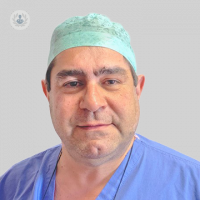Dear doctor, there’s something wrong with my gastric band
Written by:The journey to reaching your desired weight can be a challenge, and when things don’t work out as planned, it can seem like a big set-back. Gastric bands, although very effective when they work, can on rare occasions cause unpleasant symptoms for people and need to be removed. Mr Giovanni Tebala, a consultant colorectal, upper GI and laparoscopic surgeon explains to us what a gastric band removal procedure is like and why people have them.

When can you get a gastric band removed?
Gastric bands can be removed at any time. The decision to remove a gastric band depends on the symptoms and side effects you’re experiencing. Although the whole bariatric treatment must be under the care of a multidisciplinary team and a specialist bariatric surgeon (a surgeon who regularly performs anti-obesity operations), patients with complications of a bariatric operation sometimes end up with a general surgeon who deals with the condition.
What’s the operation like?
The operation is usually straightforward and most of times can be performed by laparoscopy (keyhole surgery). It involves both the removal of the band and the port - which is the small pocket containing the fluid that inflates the band. Sometimes, the band might have formed a ring of scar tissue causing a permanent stricture. It could have already eroded into the stomach and removing it would result in complex reparation surgery of the stomach. Rarely, it may even be necessary to remove part of the stomach.
Why would you need to have your gastric band removed?
Gastric banding is one of the surgical treatments for morbid obesity. It involves placing an inflatable band around the top part of the stomach; the band is connected to a reservoir that can be inflated or deflated to increase or decrease the compression on the stomach and therefore the efficacy of the band. The band works by reducing the capacity of the stomach, therefore causing you to feel full sooner. This treatment can be reversed quite easily. It can be a stand-alone procedure or used as a bridge to more complex bariatric operations.
For most patients the band is effective, but in some cases it may cause unpleasant symptoms. One of the most frequent complications is dysphagia.
Dysphagia
This is the medical term for swallowing difficulties. Some patients experience difficulty swallowing certain foods or drinks, whilst others can’t swallow at all. Even if the ultimate mechanism of the band is to prevent the patient from eating too much, he or she must maintain a free fluid intake and a minimal intake of food. If this is impossible due to persistent vomiting, the first move is to completely deflate the band by removing all the fluid from the reservoir. Usually this will improve symptoms and the patient can restart eating and drinking. Within a few days, the band can be gradually re-inflated to regain its restrictive effect.
If this doesn’t work, a gastroscopy and a barium swallow (a test used to determine the cause of swallowing difficulties) are usually enough to tell us what’s going on. The band may have created a compression on the stomach preventing the passage of solids or fluids. In this case, the band should be removed and the stomach should be repaired.
At times it can be impossible to regulate the band, the patient may report recurrent port-site infections or abdominal pain. All these conditions prompt a medical review where patients can decide to have their band removed or not.
What are the symptoms of gastric band slippage?
Vomiting and dysphagia are the first and most common symptoms of band slippage. This is where the stomach prolapses through the band. The patient gradually becomes unable to eat or drink anything, with subsequent vomiting and dehydration. Sometimes he or she can develop abdominal pain, heartburn, reflux and regurgitation.
What happens after it is removed?
The operation to remove a gastric band is usually quick and straightforward. The patient can usually go home on the same day of surgery. If some form of gastric repair has been performed, hospital stay might be longer. As soon as the patient goes home he or she can restart their normal life and diet, but ensuring they avoid fatty foods. We always suggest a normal diet and plenty of hydration to compensate for the long period of dysphagia, where the patient has not been able to get enough fluids and calories.
Fortunately, this isn’t the end of the road to losing weight and a bariatric surgeon will decide with you the best way forward. This can involve a new bariatric procedure, such as a sleeve resection or a gastric bypass.
If you are interested in having your gastric band removed or have any questions about this, visit Mr Giovanni Tebala’s profile and book an appointment with him.


